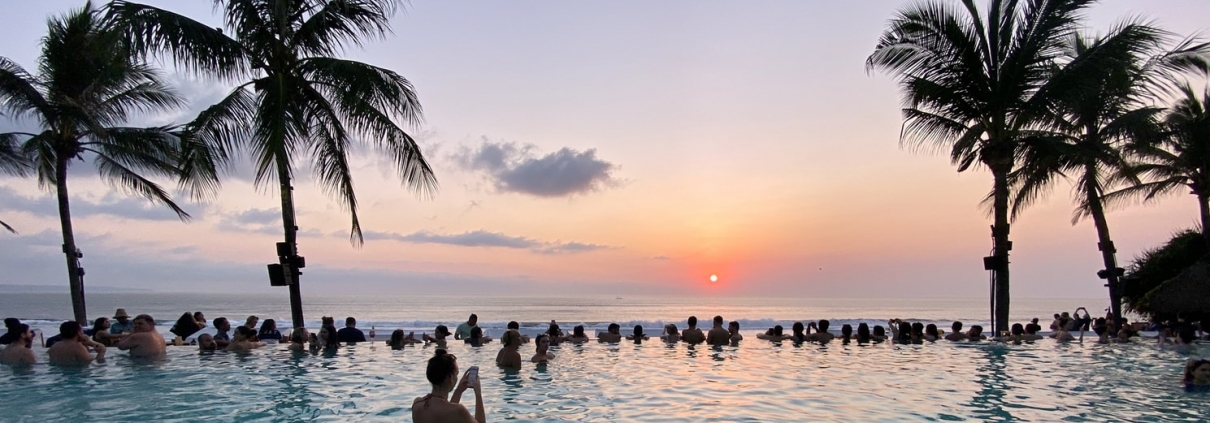HOW PR INFLUENCERS ARE SHAPING THE HOLIDAY DESTINATIONS OF YOUNG PEOPLE
If you’re a regular user of social media, you’ll know that so-called ‘Blue Monday’ has not long passed. This extremely successful marketing scheme, originally created by Sky Travel in 2005 to sell holidays, is debunked yearly. Yet despite the pseudoscience, it seems to resonate with people: we have post-Christmas fatigue, aren’t drinking or going out so much, and it’s cold and dark. January continues to be the month in which advertisers for travel companies spend the most money, as the trends indicate that this is when people want to start looking forward to a holiday.
One of the most sought-after destinations, largely popularised by influencers and celebrities, is the Indonesian island of Bali. In 2017, Bali was voted as the world’s best tourist destination by TripAdvisor reviewers. It can regularly be seen in the backdrop of Instagram influencers, and is a popular destination for Love Island contestants past and present. The appeal is clear: once the pricey flights are paid for, the cost of eating, drinking and travelling within the island are low by comparison to more traditional holiday destinations. Money aside, it’s also one of the most beautiful destinations in the world. It boasts white sands, blue beaches and waterfalls, to name but a few of its ecological attractions.
The price to pay for popularity?
There are some downsides to the huge surge in popularity for the island. Bali fares better than its neighbouring island of Lombok. Due to Lombok’s Muslim population and governance, it has tighter rules around alcohol, pork and adult entertainment. This severely impacts its popularity. However, the Indonesian government is still pushing for other islands to be visited, since the influx of tourists to Bali is reaching a maximum capacity. Over five million tourists visited the island last year, a million more people than the island’s actual population.
Over-exploitation by tourists has led the Indonesian government to declare a ‘garbage emergency’. It now plans to build ‘ten new Balis’ in order to keep up with the demand for tourism.
A similar incident occurred on the beach of Phi Phi Leh, the beach made famous by the novel and Leonardo DiCaprio movie The Beach. It has now closed until 2021 in order to recuperate and let the wildlife thrive. As many as 5,000 visitors per day came to ‘The Beach’, causing a surge of population that the infrastructure and habitat couldn’t handle.
Social media campaigns to blame?
The over-popularity could be due to the increased awareness of the island’s beauty from social media. TripAdvisor now offers so-called ‘Instagram tours’ around Bali. Does this indicate the true intention of many of its tourists might be less about observation and appreciation, and more about likes and showcasing? Likupang, an Indonesian island similar to Bali, suffers from ‘empty beaches’ despite its beauty. Eliza Borello writes for ABC Australia, ‘With almost no one in the water, there’s a sense tourists are bused to the beach for a selfie and bused back to town not long after […] Beyond the Instagram veneer, rubbish is a problem.’
The nature of Bali may carry its own appeal to Westerners. As somewhere less accessible, and in many cases a less conventional place to holiday, it might be seen as a more ‘exotic’ destination than a Spain, Greece or Canary Islands trip. Its exoticism therefore increases its appeal, and it becomes the more sought-after destination for influencers and young travellers.
New horizons
With any luck, the Indonesian government will be able to curb the over-exploitation of what is a beautiful and unique destination. Whether this comes down to the promotion of islands that are similar to Bali, or creating entirely new destinations, it would be regrettable if an island which appeal stems from its seclusion becomes unable to cope with its capacity for tourists.
Whatever happens, Bali’s success story shows the power of social media and influencers. At Source, we can give you the low-down on the latest in the digital world, including social media and online communications. Get in touch with us on 01829 7208789 to learn more, or follow us on Twitter (@source_tweets), Facebook (@SourcePublicRelations) and LinkedIn (The Source).


